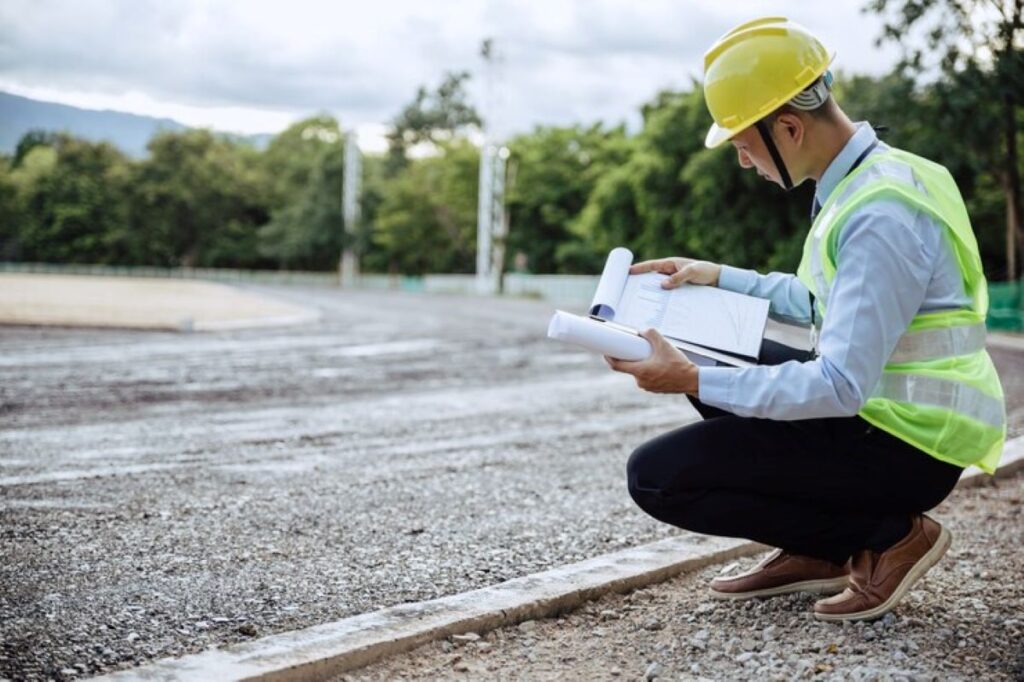Understanding the role of an engineering surveyor
An engineering surveyor plays a crucial role in the construction and civil engineering industries. They are responsible for measuring and mapping land and airspace, providing vital information to ensure that construction can proceed smoothly. This role requires both technical skill and a keen understanding of engineering principles.
Engineering surveyors are involved in various stages of a project, from initial feasibility studies to the final stages of construction. They work closely with architects, civil engineers, and construction teams to ensure that all dimensions are accurate and that the structures are built according to legal regulations and safety standards.
The basics of engineering surveying
At its core, engineering surveying is concerned with the accurate measurement and interpretation of the Earth’s surface. This discipline encompasses a wide range of activities, including setting out the geometry of structures, determining the position of natural and built features, and conducting topographic surveys.
Surveying techniques have evolved over the years, moving from traditional methods that relied heavily on manual calculations and theodolites to modern technology, such as GPS and laser scanning. Today, engineering surveyors often utilise sophisticated software to create detailed models and graphs, which are essential for modern-day construction projects.
Key responsibilities of an engineering surveyor
Engineering surveyors have several key responsibilities that contribute to the success of a project. Firstly, they perform site surveys to evaluate the physical characteristics of a location, which informs decisions about design and construction methods.
Additionally, they are responsible for establishing control points that will guide the construction process, ensuring that structures are built in the correct location relative to the land contours and legal boundaries. They also prepare reports and documentation, which provide the project team with necessary data regarding land characteristics, elevation changes, and potential obstacles.
Moreover, engineering surveyors must also be adept at liaising with various stakeholders, including local authorities and environmental agencies, to ensure compliance with regulations and to address any potential environmental concerns. Their expertise is not only pivotal in the planning stages but also in mitigating risks throughout the construction phase, as they identify any discrepancies that may arise and recommend adjustments to maintain project integrity.
In addition to their technical duties, engineering surveyors often play a role in educating other team members about the importance of accurate surveying practices. They may conduct training sessions or workshops to share knowledge about the latest technologies and methodologies, fostering a culture of precision and safety on-site. This collaborative approach not only enhances the overall quality of the project but also ensures that all team members are aligned with the project goals and standards.
The skills required for engineering surveying
To be successful in the field of engineering surveying, certain skills are essential. These skills range from technical expertise to interpersonal capabilities that allow effective communication within teams and with clients.
As the industry continues to evolve, the skill set required of engineering surveyors also expands, including the need for familiarisation with new technologies and methodologies.
Technical skills for success
Technical skills are fundamental for any engineering surveyor. Proficiency in using surveying equipment, including total stations, GPS systems, and data collection software, is paramount. Additionally, a solid understanding of physics, geometry, and mathematics is necessary to analyse and interpret the data collected accurately.
Engineering surveyors must also be adept in using computer-aided design (CAD) software, as this technology is integral to producing precise construction drawings and models. The ability to adapt to new technologies and methodologies is increasingly important in a profession characterised by constant advancement. With the rise of 3D scanning and drone technology, surveyors are now able to capture data with unprecedented accuracy and efficiency, allowing for more detailed analysis and quicker project turnaround times. This not only enhances productivity but also opens up new avenues for innovation within the field.
The importance of communication in surveying
Communication skills are equally important for engineering surveyors. Given the collaborative nature of construction projects, being able to communicate technical information clearly to both technical and non-technical stakeholders is essential. This may involve presenting complex data in a comprehensible manner or working effectively with diverse teams.
Furthermore, surveyors must be adept at negotiating with clients, contractors, and regulatory bodies. The ability to convey issues related to land and measurement accurately can significantly impact project outcomes. Therefore, strong verbal and written communication skills are critical attributes for successful engineering surveyors. In addition to these skills, cultural sensitivity and an understanding of local regulations can enhance a surveyor’s effectiveness, particularly in projects that span multiple jurisdictions or involve various community stakeholders. This awareness not only fosters better relationships but also ensures compliance with local laws and practices, which is vital for the smooth progression of any engineering project.

The educational path to becoming an engineering surveyor
Becoming an engineering surveyor requires a solid educational foundation. Prospective surveyors typically pursue degrees in surveying, civil engineering, or related fields. Accreditation from reputable institutions is essential for gaining the required knowledge and securing employment in the industry.
In addition to formal education, hands-on experience through internships or placements is invaluable, enabling aspiring surveyors to apply theoretical concepts in real-world settings. This practical exposure not only reinforces classroom learning but also helps students develop essential skills such as problem-solving, communication, and teamwork, which are crucial in the field of surveying.
Relevant degrees and qualifications
To enter the field of engineering surveying, a candidate generally needs to obtain a degree in a relevant subject, such as surveying, geomatics, civil engineering, or earth sciences. Many universities offer specific programmes focusing on surveying practices and technologies, integrating theoretical and practical learning. These programmes often include modules on land law, measurement techniques, and the use of advanced surveying equipment, equipping students with a comprehensive understanding of the discipline.
Additionally, gaining professional certification from recognised bodies, such as the Royal Institution of Chartered Surveyors (RICS) or similar organisations, significantly boosts employability. These credentials validate the surveyor’s competence and commitment to ongoing professional development, which is integral in a continually evolving industry. Furthermore, many employers prefer candidates who have undergone rigorous training and assessment through these professional bodies, as it assures them of the applicant’s dedication to maintaining high standards in their work.
Continuing professional development in surveying
The field of surveying is ever-changing due to advances in technology and methods. For this reason, continuing professional development (CPD) is essential for engineering surveyors. Many professionals engage in CPD activities, such as attending workshops, conferences, and additional training courses. These events not only provide opportunities for learning but also facilitate networking with peers and industry leaders, fostering collaboration and sharing of innovative practices.
CPD not only enhances the surveyor’s technical skills but also keeps them updated on industry best practices and regulations, ensuring that they maintain a competitive edge in the job market. It also opens avenues for specialisation, allowing surveyors to focus on areas such as GIS (Geographic Information Systems), environmental surveying, or marine surveying. Specialising in a niche area can lead to exciting career opportunities and the chance to work on diverse projects, from urban development to environmental conservation, thereby contributing positively to society and the environment.
Career prospects for engineering surveyors
The job market for engineering surveyors is promising, with many opportunities arising from increased infrastructure development and urbanisation. Engineering surveyors can find roles in various sectors, including construction, transportation, and land development.
The diverse nature of projects means that surveyors have flexibility regarding their career paths, enabling them to shift between sectors or specialise in particular fields of interest. Furthermore, the growing emphasis on sustainable development and smart city initiatives has opened new avenues for engineering surveyors. These professionals are increasingly called upon to integrate advanced technologies such as Geographic Information Systems (GIS) and Building Information Modelling (BIM) into their work, enhancing the precision and efficiency of their surveying practices.
Entry-level opportunities in surveying
For those just starting their careers in surveying, entry-level positions can serve as valuable gateways into the industry. Internships, assistant surveyor roles, and positions in surveying firms provide hands-on experience and mentorship opportunities.
As entry-level surveyors gain experience and develop their skills, they can progress to more senior positions, allowing for greater responsibility and involvement in larger projects. These foundational roles are critical for building the professional network and understanding the intricacies of the surveying profession. Additionally, many firms offer structured training programmes that not only enhance technical skills but also focus on soft skills such as communication and project management, which are vital for career advancement. CheckOut more guidence about The Role of a Boundary Surveyor in Property Disputes
Career progression and specialisation options
As engineering surveyors gain experience, they have the potential to advance into more senior roles such as senior surveyor or project manager. With additional training and certifications, they may also choose specialisation routes in areas such as environmental surveying, mining surveying, or forensic surveying.
Career advancement is often accompanied by increased responsibility, including leading teams and managing larger-scale projects. The ability to specialise can also lead to higher earning potential, making ongoing education and networking opportunities essential for career growth. Moreover, the rise of interdisciplinary projects means that engineering surveyors who can collaborate effectively with professionals from other fields, such as architects and urban planners, will find themselves in high demand. This collaborative approach not only enriches their own expertise but also contributes to the successful delivery of complex projects that meet modern societal needs.
The impact of engineering surveyors on construction projects
Engineering surveyors play a pivotal role in ensuring successful construction projects. Their expertise directly influences the project outcome and significant aspects of risk management and safety.
From setting control points to documenting site conditions, engineering surveyors enhance overall project efficiency, directly affecting timelines and budgets. Their work ensures that structures are not only built correctly but also safely and in accordance with regulations.
Ensuring accuracy in construction
Accurate measurements and data analysis are foundational for successful construction. Engineering surveyors ensure that all measurements are precise, helping to avoid costly mistakes and delays.
Utilising advanced technology, such as 3D laser scanning and digital mapping, surveyors are able to provide highly accurate data. This data informs the construction team, leading to reduced errors and efficient project delivery. In turn, this accuracy enhances client satisfaction, reflects positively on the surveyor’s capabilities, and bolsters the team’s reputation within the industry.

Risk management and safety considerations
Engineering surveyors also play a crucial role in risk management throughout the construction process. Their surveys identify possible hazards before work begins, enabling teams to implement safety measures effectively.
In addition, their ongoing evaluations during construction help to ensure compliance with safety standards and regulations. By prioritising safety and minimising risks, engineering surveyors contribute significantly to the wellbeing of all personnel involved in a project, ultimately creating a secure environment for successful construction.
